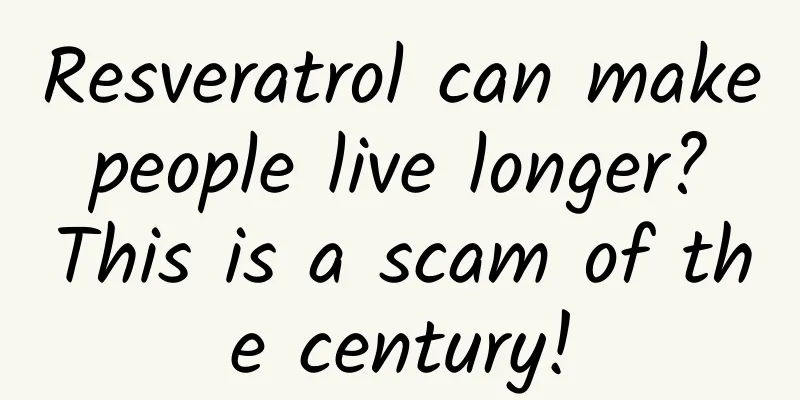Resveratrol can make people live longer? This is a scam of the century!

|
Rumor: "Resveratrol can make people live longer" Since the beginning of this century, resveratrol has attracted much attention as a "longevity drug". People believe that it can delay aging and prolong life. Related health products are also popular. Rumor analysis: This statement is debatable. In fact, there is no effective evidence to prove that resveratrol can help humans fight aging. The so-called "evidence" mainly stays at the stage of cell experiments or animal experiments. In addition, resveratrol has also been found to have many side effects. When it comes to resveratrol, most people are familiar with it. Because it is believed to have antioxidant, whitening and anti-aging effects, people used to flock to health care products and skin care products containing resveratrol. But in fact, the myth of resveratrol is likely to be a "scam of the century." Resveratrol structure Resveratrol - the rise of the longevity drug It all started with David Sinclair, a professor at Harvard University, who conducted in-depth research on resveratrol based on previous research, first claiming that resveratrol in red wine could extend the lifespan of yeast, and published his research results in the top journal Nature in 2003. David Sinclair Subsequently, he published a number of articles in succession, elaborating on the positive role of resveratrol in extending the lifespan of mice, fruit flies and other organisms, suggesting that it has potential in the treatment of human diseases and the extension of lifespan. Due to his important position in the academic community, resveratrol became famous and was hailed as a "longevity magic drug". Even red wine was listed on the recommended list of healthy foods because it contained resveratrol, and was dubbed "antioxidant" and "heart care", but the facts may not be so. In addition to scientific research, David Sinclair also established a company dedicated to the study of resveratrol in 2004, and was acquired by a pharmaceutical company for more than 700 million US dollars four years later. The intervention of capital did not make the research on resveratrol more in-depth and comprehensive. On the contrary, the subjects experienced various adverse reactions, and the lack of evidence for anti-aging research caused the company to close down soon and the research was terminated. However, the commercialization of resveratrol does not seem to be affected. The sales of resveratrol supplements, cosmetics, and skin care products have continued to rise, even though the research evidence is not conclusive. The founder of resveratrol who fell from grace was forced to resign Since then, although David Sinclair has continued to publish articles about resveratrol's ability to prolong human lifespan, and has insisted on promoting his practice of taking resveratrol to "reverse" aging in interviews, more research results have contradicted this, revealing that resveratrol may not have these effects. First, David Sinclair's findings are difficult to replicate. Kevin J. Pearson and other researchers concluded under similar experimental conditions that "resveratrol can improve some health conditions, but does not increase the lifespan of adult mice." Irreproducibility is a serious problem in scientific research, which means that the reliability of the research is questionable and reduces the public's trust in scientific research results. Secondly, Professor David Sinclair's research conclusions are mostly based on the results of animal and cell experiments. The few human experiments mainly focus on the safety and bioavailability of resveratrol in humans, and do not involve its anti-aging effects in humans. Other scientists have conducted some research on the application of resveratrol in humans, but most of them are about its application in anti-tumor and improving cardiovascular disease, and the research conclusions are inconsistent. For example, the research of Adi Y. Berman et al. pointed out that resveratrol has vague effects in certain cancers and non-alcoholic fatty liver disease, and sometimes even harmful. Research by James M. Smoliga et al. suggests that resveratrol may increase the risk of lymphoma and solid tumors. Some studies have also confirmed that high-dose use of resveratrol may cause adverse reactions such as gastrointestinal discomfort, poor coagulation, and DNA damage. The meta-analysis results of Hector KL et al. show that resveratrol has no obvious advantage in prolonging life. Copyrighted stock images, no reproduction is authorized In short, the scientific community has reached a relatively unified conclusion about resveratrol: whether resveratrol is necessary for human use requires further research. Scientists also emphasize that resveratrol may have potential in anti-inflammatory, anti-tumor, and antioxidant aspects, but if it is to be used in humans, more high-quality, large-scale clinical trials are needed and should be "carefully considered." Therefore, no authoritative organization has yet given guidelines or plans for the clinical application of resveratrol. This also reminds us that it may be unnecessary to follow the trend and buy resveratrol supplements. Recently, Professor David Sinclair, the former "Father of Resveratrol", is facing a serious academic crisis: he posted another "anti-aging ingredient" for which there is insufficient research evidence on social media, claiming that it can prolong the lifespan of dogs, and attached a "sales link". In fact, the study only preliminarily confirmed that this ingredient can briefly and slightly improve dogs' cognition. Several scientists questioned his exaggeration of research conclusions, believing that his eagerness to turn immature research conclusions into commercial results was very "unscientific". Several professors from the Harvard Health and Longevity Institute even resigned in anger. Subsequently, he was forced to apologize and resign. How can ordinary people identify controversial scientific research? Besides enjoying the melon, as ordinary people, facing the reality that "the conclusions of scientific research may not be scientific", how can we better identify and use them to guide our lives? The following three suggestions are for reference. 1. See whether the research conclusions are based on animal experiments or clinical trials. Clinical trials are more complex and rigorous than animal experiments, and the results are more reflective of their application in humans. 2. See if there are more scientists who hold similar conclusions or more studies that reach similar conclusions. The more similar studies there are among peers, the more reproducible and reliable the conclusions will be. 3. Perhaps the simplest and most intuitive method is to see whether the researcher has any vested interest in the commercial products that the research conclusions can be transformed into. The saying "the head follows the butt" is widely applicable. If there is a conflict of interest between researchers and commercial products, it is necessary to be cautious. Our understanding of the world is constantly being revised, and the conclusions of scientific research are not always black and white. But we still hope to preserve a piece of pure land for science, at least to make the research conclusions neutral and prudent before they go to the market, and to allow ordinary people to retain the right to independent and objective judgment. Looking in the mirror of rumors As mentioned in the last paragraph of this article, when we look at scientific research, especially when it comes to medicines and health products, we must first see whether the research on the human body is already mature; second, we must look at peer review to see whether it is widely recognized in the industry; at the same time, we must also be careful about the involvement of commercial interests. References [1] Howitz, K., Bitterman, K., Cohen, H. et al. Small molecule activators of sirtuins extend Saccharomyces cerevisiae lifespan. Nature 425, 191–196 (2003). [2]Baur JA, Pearson KJ, Price NL, Jamieson HA, Lerin C, Kalra A, Prabhu VV, Allard JS, Lopez-Lluch G, Lewis K, Pistell PJ, Poosala S, Becker KG, Boss O, Gwinn D, Wang M, Ramaswamy S, Fishbein KW, Spencer RG, Lakatta EG, Le Couteur D, Shaw RJ, Navas P, Puigserver P, Ingram DK, de Cabo R, Sinclair DA. Resveratrol improves health and survival of mice on a high-calorie diet. Nature. 2006 Nov 16;444(7117):337-42. [3]Baur, J., Sinclair, D. Therapeutic potential of resveratrol: the in vivo evidence. Nat Rev Drug Discov 5, 493–506 (2006). [4]Bonkowski, M., Sinclair, D. Slowing ageing by design: the rise of NAD+ and sirtuin-activating compounds. Nat Rev Mol Cell Biol 17, 679–690 (2016). [5]Kevin J. Pearson, Joseph A. Baur, Rafael de Cabo. Resveratrol Delays Age-Related Deterioration and Mimics Transcriptional Aspects of Dietary Restriction without Extending Life Span, Cell Metabolism, Volume 8, Issue 2, 2008: 157-168. [6]Berman, AY, Motechin, RA, Wiesenfeld, MY et al. The therapeutic potential of resveratrol: a review of clinical trials. npj Precision Onc 1, 35 (2017). [7]Smoliga JM, Baur JA, Hausenblas HA. Resveratrol and health--a comprehensive review of human clinical trials. Mol Nutr Food Res. 2011 Aug;55(8):1129-41. [8]Brown K, Theofanous D, Britton RG, Aburido G, Pepper C, Sri Undru S, Howells L. Resveratrol for the Management of Human Health: How Far Have We Come? A Systematic Review of Resveratrol Clinical Trials to Highlight Gaps and Opportunities. Int J Mol Sci. 2024 Jan 6;25(2):747. [9]Pezzuto JM. Resveratrol: Twenty Years of Growth, Development and Controversy. Biomol Ther (Seoul). 2019 Jan 1;27(1):1-14. [10]Hector KL, Lagisz M, Nakagawa S. The effect of resveratrol on longevity across species: a meta-analysis. Biol Lett. 2012 Oct 23;8(5):790-3. [11]Brown K, Theofanous D, Britton RG, Aburido G, Pepper C, Sri Undru S, Howells L. Resveratrol for the Management of Human Health: How Far Have We Come? A Systematic Review of Resveratrol Clinical Trials to Highlight Gaps and Opportunities. Int J Mol Sci. 2024 Jan 6;25(2):747. [12]Simon, KE, Russell, K., Mondino, A. et al. A randomized, controlled clinical trial demonstrates improved owner-assessed cognitive function in senior dogs receiving a senolytic and NAD+ precursor combination. Sci Rep 14, 12399 (2024). Author: Wang Lu, registered dietitian Review | Ruan Guangfeng, Deputy Director of Kexin Food and Health Information Exchange Center |
<<: What efforts has mankind made to control the growth of plants?
>>: #千万IP创科学普# How to charge safely when riding in winter?
Recommend
How many steps are needed to neatly fold three parachutes the size of basketball courts and put them into the return capsule?
The main parachute has an area of 1,200 square ...
A crystal composed entirely of electrons? This prediction was made 90 years ago, and it really happened this time.
A new exotic substance once again proves the magi...
Where should I sit on a plane? Is there really a "safest seat" on an airplane?
Nowadays, more and more friends choose to travel ...
Yogurt and strong tea can help sober you up? Doctor: These are not effective for sobering you up. What really works is…
"The deeper the friendship, the better!"...
Channel pitfalls: 8 hidden rules of App operation
First, let’s deconstruct the position of App Oper...
Wuji Doudian fruit category full-case gameplay, Douyin store fruit practice class, 2022 Douyin e-commerce bonus outlet
Wuji Doudian fruit category full-case gameplay, D...
How much do you know about product conversion: 4 analysis models for high conversion
What is conversion Conversion includes two things...
Baidu SEM bidding price adjustment principles and techniques shared!
After Baidu launched the Fengchao system, althoug...
China Association of Automobile Manufacturers: Production and sales of automobile industry in May 2024
According to the analysis of the China Associatio...
How to master fan circle marketing?
The "2018 White Paper on Chinese Youth Socia...
How can products improve user stickiness? Here are 3 tips
These people used to be our customers, but they d...
The price hike strikes again: How can small and medium-sized refrigerator companies survive?
Hard times are still continuing in the refrigerat...
How did the holiday end so quickly? What influenced your feelings?
There is an old saying that "time flies by l...
"Scientific management is the way to govern the country" - Remembering Academician Wang Yingluo, the founder of my country's system management discipline
Academician Wang Yingluo (1930-2023) On the eveni...
What are the characteristics of a pua man, and what does online PUA mean?
Recently, the topic of PUA has once again become ...


![Fengyun Media Douyin live streaming practical course: 3 days to blow up the live broadcast room and 7 days of stable natural flow gameplay [Video course]](/upload/images/67cc2dee27078.webp)






